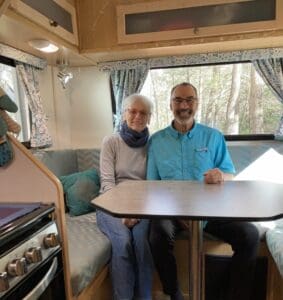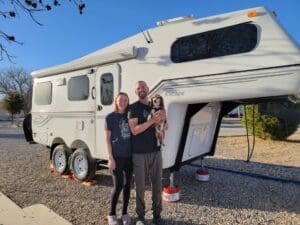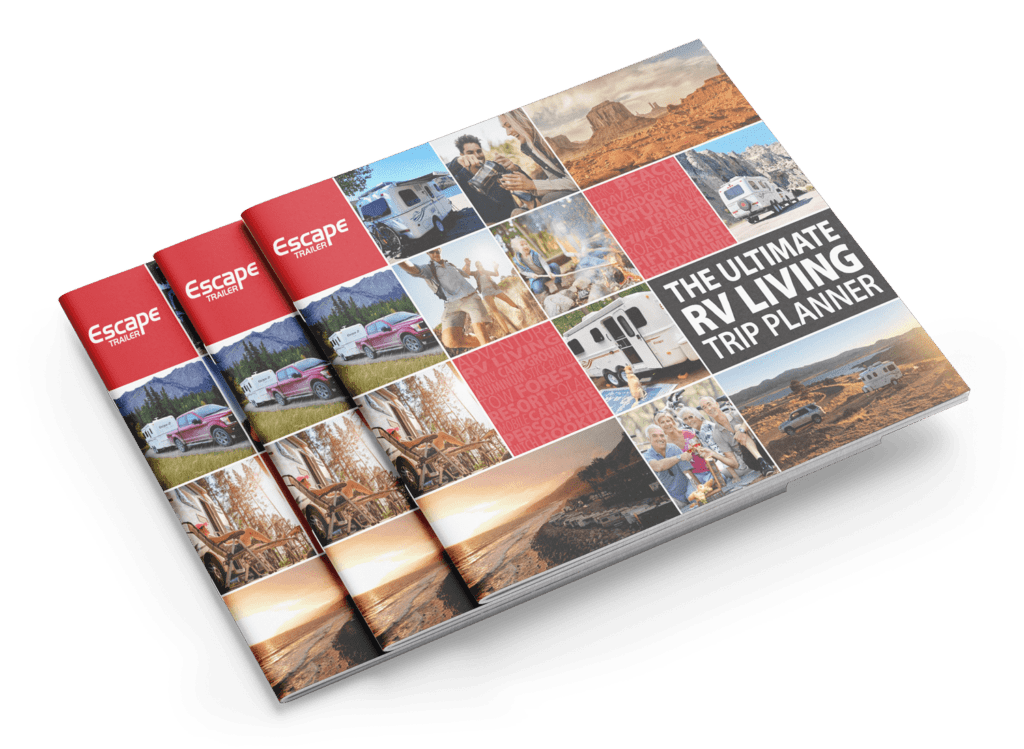Simple Hacks to Save Water on the Open Road
An RV and open road bring unlimited possibilities and limitless joy. But sometimes conditions or circumstances can limit your freedom. Going without water is one of the biggest hindrances to where you can go and for how long. With so many people wanting to escape the hustle and bustle of everyday life by camping in more remote areas, this can pose a real problem. If you’re planning an overlanding adventure, an off-grid trip, or you simply want to plan ahead because you’re not a fan of limits, we have some simple hacks that will help you save water on your trip.
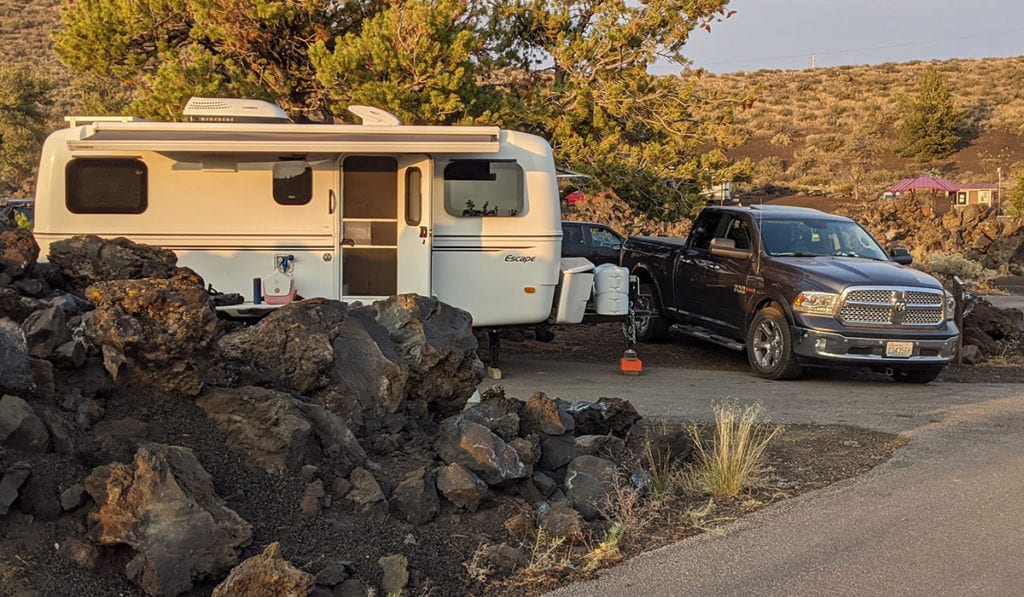
General water saving tips
Before you start saving water you have to prepare to save water. This means you have to do a few things before leaving on your trip.
First, check your water system and make sure that there are no leaks. Leaks will waste more water than you can imagine, really reducing the time between tank fills.
Make sure that your RV is level so that the tank holds all that it can when you fill it. If you don’t there will be trapped air in your tank, taking the place of several gallons of water.
Consider installing a flow meter. This device allows you to know exactly how much water you have. It also comes in handy for monitoring the amount of water that you use for things like dishes and showers.
You will also want to bring along a hand water pump and a hose or two.
Know your sources for water along the way
Two great ways to supplement the water you have are 1) to refill when you can and 2) to carry extra in your tow vehicle.
Carry extra water

If you have room, put two or three five-gallon water containers in your tow vehicle. This can easily extend your water supply one or two more days. Bring along a small hand pump to help with the water transfer.
You can also top off your water supply as you go. Many rest areas, truck stops, and campgrounds have spigots that you can use. Always ask before you start filling up. While most places will let you take as much water as you want, it is better to be polite and ask first. Remember to thank the attendant, afterward. Use a hose or two to connect your RV to the spigot.
While boondocking or overlanding, having a full load of water before you park is a great and efficient way to extend your stay. You will want to bring water purification tablets, too, just in case.
Pinpoint meals & dishwashing techniques that don’t use excessive water
Meals can account for a lot of your water use. Between cooking and washing dishes, meals can use a lot of unnecessary water without you realizing it. Luckily, there are many ways that you can reduce water used for meals.
Some easy ways to conserve water-related to meal prep and clean up include:
- Use paper so you don’t have to wash dishes.
- Make meals out of one pot or pan so you have fewer dishes to wash.
- Prepare and freeze meals before you leave. This way you only have to warm them in the microwave–no pots or pans to wash.
- Try to cook more than one meal at a time. You’ll have no pots to clean the second time around.
- Steaming or boiling, instead of frying, makes it easier to clean pots and pans.
- If washing dishes, wipe them with paper towels before washing them to keep the dishwater cleaner.
- When washing dishes, you can use two tubs, one for soapy water, one for rinsing.
- After washing dishes, you can save the water for flushing the toilet if it’s clean enough.
- Cooking directly over a fire allows you to conserve water and propane.
These are all very simple ways to save water, and you won’t have to sacrifice cleanliness at all. It might take just a little extra work, but it is worth it if you can stay in a picturesque location for a couple of extra days.
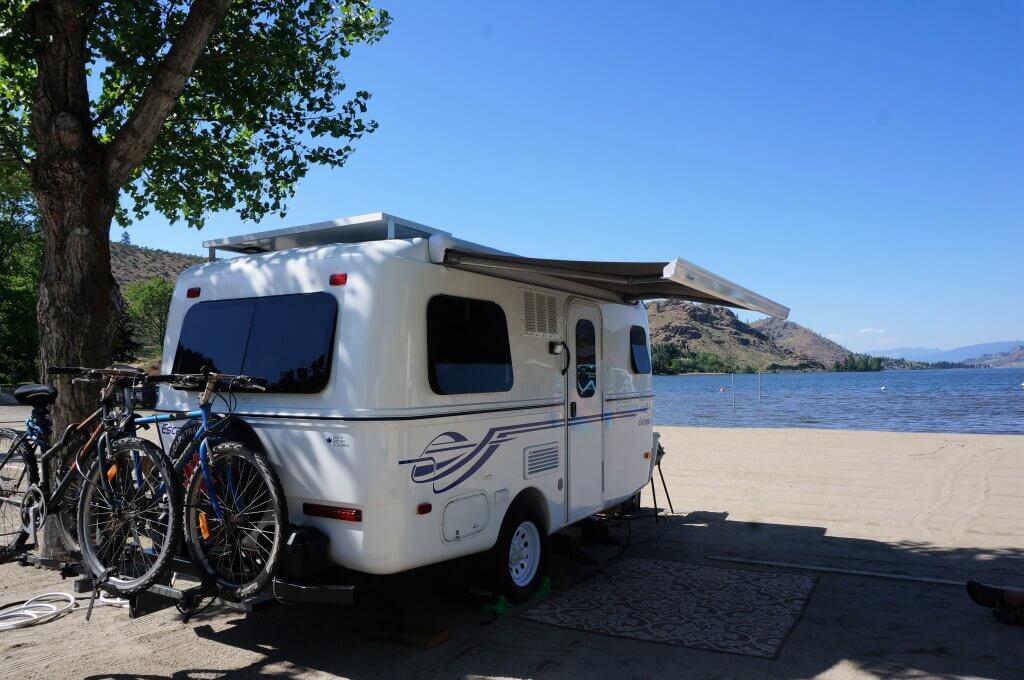
Cut down on water use while bathing
Bathing is necessary yet requires large amounts of water. And you may be a bit hesitant to change your showering habits since no one likes to feel clammy or smelly. However, this is not a problem because it is easy to reduce your water use and stay clean.
Here are some simple and effective ways to save water while bathing:
- Pack a 5-gallon container of fresh water to use just for washing your hands and face.
- Use baby wipes when you don’t need a complete shower.
- Take shorter showers–Get wet, shut off, lather, then rinse.
- Install a low-flow showerhead to reduce the water used in the shower.
- When bathing, shaving, etc, save water in a bucket for grey uses.
- Avoid bathing products that contain sodium laureth sulfate because it creates more suds and takes more water to wash off.
- Use a “dry shampoo.” It may be more expensive but cleans your hair well without water.
- Shut off the water while brushing teeth or use your packed 5-gallon container.
After a while, saving water while bathing becomes second nature.
Going to the bathroom with less water
When you flush the toilet in your RV, you’re flushing away an abundance of water. There are some simple methods to reduce water usage in the loo, though. Some are simple and inexpensive, while others take a bit more work and funds. Fortunately, none of these water-saving techniques are difficult to do.
- Install a greywater system that will collect water from the sink and shower, then use it for the toilet.
- Go to the bathroom outside when it is possible.
- Use the campground bathroom when you are not off-grid.
- Install a toilet that uses less water per flush.
- Install a composting toilet–they can be vented outside to reduce any unpleasant smell.
- Flush only when there are solid wastes (“When it’s yellow let it mellow”).
- Install low-flow faucets in bathroom and kitchen sinks, along with a low-flow showerhead.
- Don’t let the shower warm-up before you hop in. This is great on hot days!
- If you are lucky enough to be isolated, bathe in a stream or lake near your campsite.
These are all simple ways to reduce the water that you use. Some, like composting toilets can be more difficult and more expensive, but others like using campground facilities or going out in nature are totally free.
Other ways to reduce water use
If you are using bagged ice, save the water that melts for dishes or flushing. You can also set a rain collection system if you’re boondocking. Just a couple of gallons added to your supply can be used for a load of dishes or a couple of flushes of the toilet.
Camping by a lake or stream? Just dip out water as needed for grey water usage, or you can use a portable water filter to clean a large quantity of water at a time.
Finally, put water in spray bottles for washing your face and hands. It will help you use less when washing up.
Save water, extend your Escape
When camping off-grid, boondocking, or RVing with long stints between stops, there is no need to rough it when it comes to water. There are many simple and effective ways to reduce the water you use. If you plan wisely and use water carefully, a week can be turned into ten days, and ten days into two weeks, all without sacrificing comfort and cleanliness.
To receive our newsletter by e-mail, please click the “Subscribe” button in the footer below.









